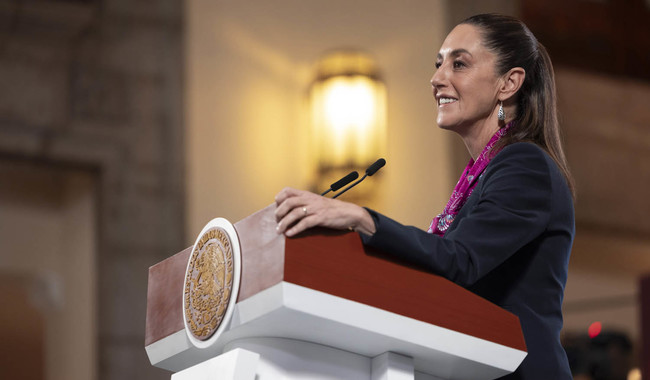Mexico demands evidence after U.S. accuses three banks of laundering cartel cash
MEXICO CITY — Just days after the U.S. Treasury called out three Mexican financial institutions for allegedly laundering cartel money linked to fentanyl trafficking, President Claudia Sheinbaum clapped back with a clear message: “No hay pruebas, solo dichos.” Translation? “No proof, just hearsay.”
In her signature morning press conference, Sheinbaum addressed the accusations leveled against CIBanco, Intercam, and Vector Casa de Bolsa—which the U.S. Financial Crimes Enforcement Network (FinCEN) declared part of the fentanyl money machine. But according to Mexico’s top leader, the Treasury’s claims came without actual evidence. No bank statements, no names, no smoking gun. Just a memo and a very public naming and shaming.
And Sheinbaum didn’t mince words: “Mexico is no one’s piñata.”
The Mexican Government’s Response? Investigate—But Don’t Jump to Conclusions
Sheinbaum says Mexico’s Ministry of Finance and Financial Intelligence Unit (UIF) received a confidential heads-up from FinCEN weeks ago, but that tip-off lacked the “why.” As in: why exactly does the U.S. think these banks are laundering drug money?
Since then, Mexico has formally asked for more details. Sheinbaum emphasized that the Chinese companies mentioned in the U.S. report are legally registered and that $139 billion in trade between China and Mexico isn’t built on crime—it’s built on commerce.
As for the alleged dirty transfers? “Just regular business,” Sheinbaum says, pointing out that thousands of similar transactions occur every day between Mexican and Chinese companies.
But Didn’t the U.S. Mention Cartels, Opioids, and Even García Luna?
Yes. And that’s where things get a little murky.
The FinCEN statement didn’t just throw shade—it dropped full-on accusations. The report linked the banks to the Sinaloa Cartel, Gulf Cartel, and CJNG. It even claimed that Vector helped launder $2 million and processed $40 million tied to Genaro García Luna, Mexico’s former top cop, who’s now sitting in a U.S. jail cell over cartel connections.
But Vector’s CEO, Eduardo Cantú, fired back on the radio: they checked their records, and neither García Luna nor his companies were ever their clients. And those Mexican firms tied to the alleged schemes? “Not our clients either,” said Cantú. Vector claims it’s been in touch with regulators and is happy to cooperate—just waiting for actual receipts from the U.S.
Intercam and CIBanco also denied any wrongdoing. In nearly identical statements, they said they comply with all Mexican and international financial rules and stand ready to work with both governments to clear things up.
Is This Just About Banks?
Not quite. The U.S. accusations have turned into something bigger—a potential political flashpoint.
One of the three institutions under fire, Vector, has ties to Alfonso Romo, a powerful businessman and close ally of former President Andrés Manuel López Obrador. That connection didn’t go unnoticed. Critics say the Treasury’s move may carry a hidden message aimed at figures within the current Mexican ruling party, Morena.
Meanwhile, canceled U.S. visas for other Mexican officials, including Baja California’s governor, have fueled speculation about wider investigations into cartel links at high levels of government.
Sheinbaum’s Bottom Line?
If there’s proof, Mexico will act. If not, don’t expect them to roll over.
“We’re not covering for anyone,” Sheinbaum said. “But we won’t act on speculation either.” She pointed to past U.S. missteps, including the high-profile arrest—and quiet release—of General Salvador Cienfuegos in 2020, as evidence that Washington can sometimes jump the gun.
While Mexican financial regulators have found minor administrative infractions at the banks in question, no signs of money laundering have surfaced so far.
Sheinbaum insists Mexico will keep asking for solid evidence and keep investigating. But until then, her stance is firm: “We are a free, sovereign country. We collaborate, but we don’t take orders.”
Let’s see if the Treasury’s next move comes with more than bold headlines.



